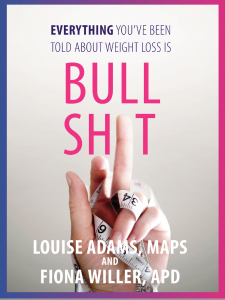I’m in the final stages of preparing a workshop I’m presenting later this week at the Australia & New Zealand Academy for Eating Disorders (ANZAED) conference in Melbourne. Alongside the fantastic Janet Lowndes, psychologist from Mind Body Well (and one of our UNTRAPPED guides), we’ll be speaking to an audience of eating disorder specialists about working with people with eating disorders at higher weights. Specifically, we’re saying that the growing practice of ‘treating’ higher weight eating disorder sufferers with a blend of standard psychological treatment plus a weight loss diet is the absolutely wrong direction for us to be going in.
By putting larger people with eating disorders on diets, we’re not only creating mass confusion within treatment, we’re doing harm. It’s utterly gobsmacking that this trend is catching on, but it’s definitely picking up steam. Weight stigma and bias against people in larger bodies is so rife that it seems the ‘thinner at all costs’ mantra has worked its way into how we treat mental illness.
At its heart, an eating disorder is a psychological issue. The engine room of an eating disorder is a dissatisfaction or ‘overevaluation’ of weight and shape; that is, the person’s sense of self-worth is far too wrapped up in their weight. This over-evaluation is not surprising when we think of the pressure that diet culture puts on all of us.
Treating an eating disorder is all about helping the person to reduce the importance of their weight and shape, to let go of the weight focus and appreciate themselves for non-appearance based reasons. Treatment is also very much about helping people to stop the vicious cycle of weight loss dieting, which only leads to repeated cycles of short-term loss and long-term gain for the vast majority of sufferers. Eating disorders are very nasty, very long lasting, and extremely dangerous psychological illnesses: they are not to be messed with.
Treatment outcomes vary, but good outcomes happen for people with the more common forms of eating disorders: binge eating, bulimia, and ‘non-specific’ eating disorders (which basically mean those disorders which don’t quite meet diagnostic criteria but still play havoc in a person’s life).
Eating disorders in higher weight people are now being more readily identified and diagnosed, thanks to the inclusion of diagnoses such as Binge Eating Disorder (BED) in our diagnostic manual, the DSM-V, in 2013. But alongside this recognition that not all eating disorders are the anorexic type has come a very troubling tendency for eating disorder treatment to start ‘treating’ the person’s body weight as if it were as important as the psychological disorder itself.
This is weight bias in action: diet culture is so totally gung-ho in its pathologising of higher body weight that it has difficulty acknowledging that being bigger is not a mental illness, or a disease*. We cannot justify recommending weight loss dieting to an eating disorder sufferer. No matter what they weigh. As Deb Burgard has said, “We prescribe for fat people what we diagnose as disordered in thin people”. When we do this, we collude with the heart of the disorder that we are trying to treat.
The confusion that stems from this collusion is rife, and showing up in our treatment manuals and centres. In an analysis of this ‘gold standard’ treatment manual for BED and bulimia, Brown-Bowers, Ward, and Cormier (2016) note that:
“The manual endorses the very same practices—food restriction and positioning certain foods and eating practices as “bad”—that it emphatically problematizes elsewhere. Strategies that promote weight loss are privileged over strategies that target the DSM diagnostic symptoms of the disorder or its proposed causal and maintenance mechanisms. This troubling observation speaks to how powerful the medicalized and weight loss imperative discourses are—both this study’s authors and a body of scholarship acknowledge the failure of this approach, yet it cannot be helped—fat bodies must be brought back into control.”
And let’s not forget that the weight loss diets that are being suggested by ED treatments are just as crappy and ineffective as every other diet out there. Some researchers assert that ‘gold standard behavioural weight loss treatment’ is somehow more effective than Weight Watchers or 5:2 or Optifast or low carb or any number of ‘fad’ diets, but the truth is the gold standard ones are, at best, a fool’s gold standard.
A very large, well-controlled trial compared the world’s most advanced Cognitive Behaviour Therapy for weight loss with behavioural weight loss and the LEARN program, all 3 of which are considered to be the bee’s knees when it comes to ‘sensible,’ supervised weight loss. The researchers followed people for three years, and guess what they found? – the same pattern of initial weight loss, followed by weight regain, which we’ve been seeing for the last 70 years in weight science research. By the end of the 3 year follow up, everyone put the weight back on.
The study’s authors, who are very big names in the eating disorder and weight science world, concluded that:
“It is ethically questionable to claim that psychological treatments for obesity “work” in the absence of data on their longer-term effects.” – (Cooper, Doll, Hawker, Byrne, Bonner, Eeley, O’Connor & Fairburn, 2010)
This is a BIG statement, and one we should listen to. There is finally beginning to be an inkling of awareness of just how pointless weight loss dieting is, and this goes for so-called ‘gold standard’ weight loss efforts, as well as other types of diets. A diet is a diet is a diet, fullstop!
And finally, we MUST consider the harm done by the trend to put people with eating disorders on diets: the incalculable human cost of someone coming to a treatment centre, in good faith, putting themselves in the hands of a health professional, and having the experience of having their eating disorder REINFORCED by someone in power.
It doesn’t bear thinking about. I have had too many conversations with people harmed by their help-seeking, and it breaks my heart. It makes me angry as well, and gives me the courage to stand up and hopefully be heard by this room full of people.
I’ll let you know how it goes!
*In Australia – although in the USA lobby groups have succeeded in designating ‘obesity’ as a ‘disease’. This doesn’t make it true – subject for another blog post!!


